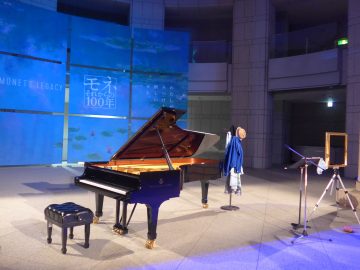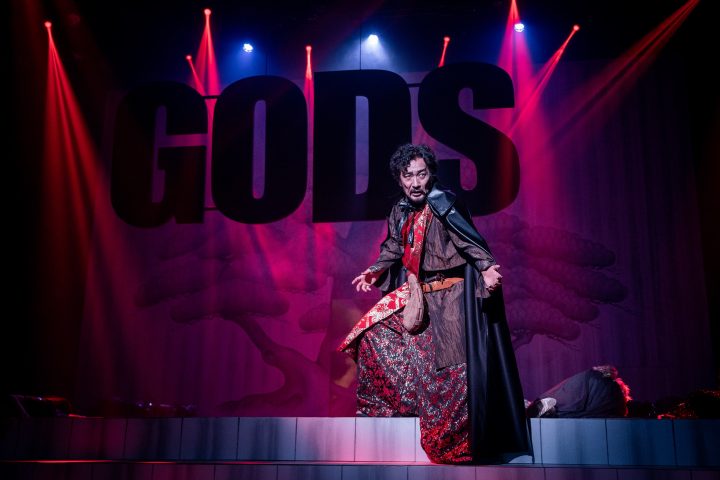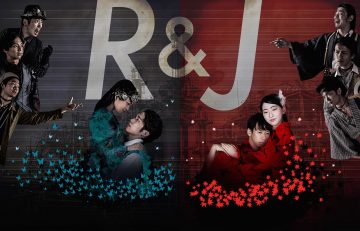Kanagawa・Standing Drinking Culture Talk Vol.8 Final Episode! "Eros and Chaos"
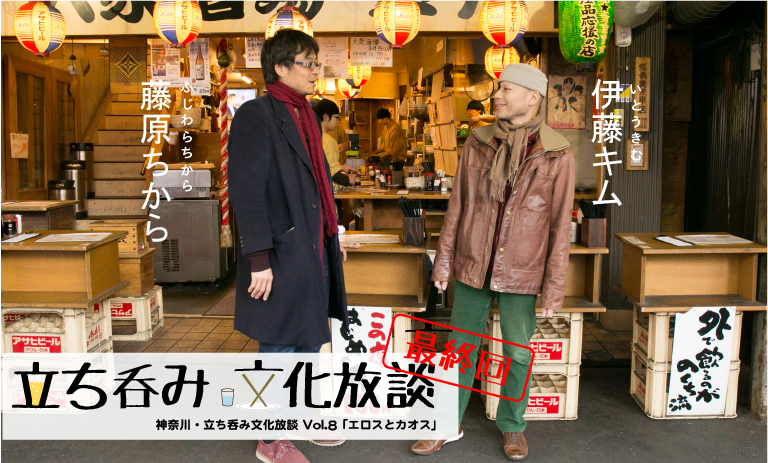
TEXT: Akiko Inoue PHOTO: Masamasa Nishino Published on March 11, 2016
Chikara Fujiwara
Editor, critic, and founder of BricolaQ. Born in Kochi City in 1977. Moved to Tokyo at the age of 12 and began living alone there. Moved around a lot after that, worked for a publishing company before going freelance. Edited Musashino Art University's newsletter "mauleaf" and Setagaya Public Theater's "CaroMag". Co-edited with Tsujimoto Chikara "Book Guide to Architecture" (Meigetsudo Shoten). Co-authored with Tokunaga Kyoko "The Strongest Engeki Theory" (Asuka Shinsha). Currently lives in Yokohama. Member of Theatre Center F. Also creates "Engeki Quests" in various locations, where participants stroll around cities and peninsulas with gamebooks in hand.
Kim Ito
In 1987, she studied under dancer Anzu Furukawa. In 1995, she formed "Kim Itoh + Shining Future". In 1996, she won the Bagnolet International Choreography Award, and in 2002, she received the 1st Asahi Performing Arts Award and Terayama Shuji Award. From 2005 to 2006, she backpacked around the world for six months. She is a visiting professor at Kyoto University of Art and Design. She completed the Workshop Designer Development Program at Aoyama Gakuin University. In 2015, she formed the new company GERO and resumed creative activities for the first time in 10 years.

Tamai Nishiguchi store is conveniently located just a minute's walk from Mizonokuchi Station, in a corner of a shopping street where traces of the postwar black market still remain. The store is spacious, with a standing bar area in the front, chair seating in the back, and a tatami room on the second floor!
First, we decided to start drinking in the standing bar area...
Fujiwara Chikara (hereinafter Fujiwara) : If you write your first order yourself, you'll get a 10 yen discount. What would you like?

There is an order sheet at the standing bar where customers can write their orders using the provided pens. First, the two of them carefully choose their menu.
Itoh Kim (hereinafter Kim) : Hmm...then Satsuma Tsukasa on the rocks...ah, but I'd prefer beer!
Fujiwara : Then I'll have a black Hoppy.
Also, I want to try the meatballs, which are popular. And some yakitori. And can I have some beef tendon curry?
Kim : That's great. And I'd like a tofu salad, please.
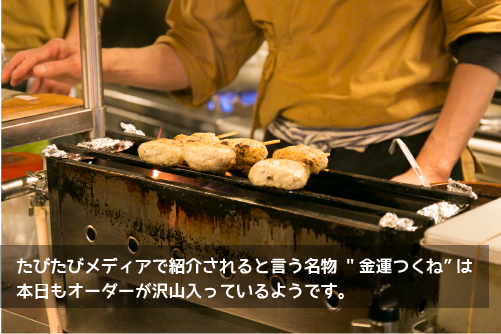
Once you've finished writing your order...
Fujiwara : Today is actually the final episode of this project.
Kim : What? Is that so?
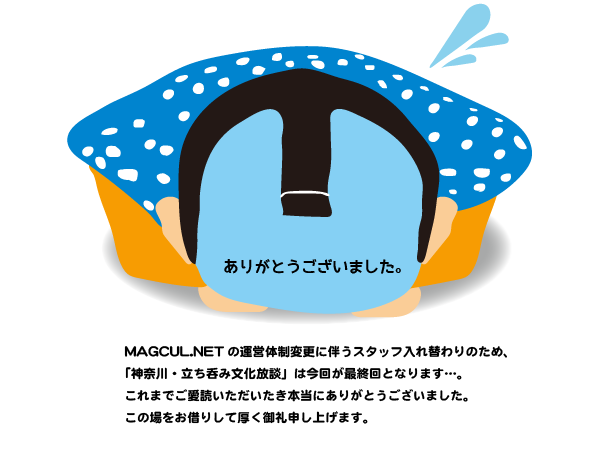
Fujiwara : So, the theme of today's chat is "words and body," which is also the theme of Kim's new company "GERO" that he launched in January... but with that in mind, since this is the memorable final episode, I thought I'd broaden the scope a bit.
So, although it may seem abrupt, I would like to go with "Eros and Chaos."
Kim : Yes (laughs) "Eros and Chaos"...
So, for now,
cheers!
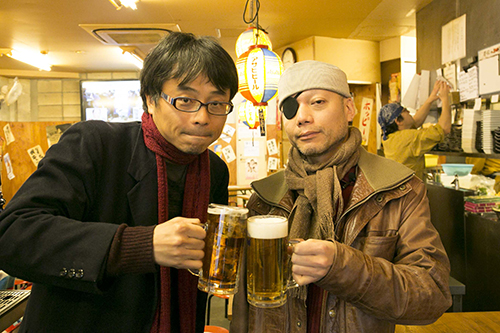
About the new company "GERO"
Kim : I don't think many people drink before 4 o'clock.
Fujiwara : There have been a total of eight episodes of this standing bar talk, and the episode with Nejiko (Pijin) and Fujii (Kenji) started drinking in the afternoon. So this is the third time including this one. They've been doing it quite a lot... (laughs)
I would like to ask you about your new company "GERO's" work "Kuchi Kara Deru". I left for the Philippines on the opening day and returned yesterday, so I was not able to see the actual performance, but I was able to see the rehearsal and watch the recorded video of the performance.
How did you feel after the inaugural performance?
Kim : Hmm... I guess...
The reviews from people who watched it were mixed, but those who often watch works in this industry were generally critical. On the other hand, those who don't may have been well-received. Someone told me that they got the impression that "someone who knows a lot about the body tried to use words," but I think that means "the body is okay, but the words still have a long way to go." I myself am still not sure how to incorporate both words and the body, so I think it will be a trial and error process from now on.

Photos from the inaugural performance of "Kuchikaraderu" at KAAT Kanagawa Arts Theatre Ⓒbozzo
Fujiwara : Basically, Kim doesn't appear in "GERO." Why is that?
Kim : I was performing in "Shining Future" (the company that Kim used to lead) , but I have such a strong impact that it was difficult to blend in with the others. Also, not performing allows me to focus on creating.
Fujiwara : I see. By the way, the director tends to have a lot of power in the rehearsal room, but when I visited, I was impressed by the sight of everyone sharing their opinions and giving feedback.
Kim : Last year, when I performed in Sample's play "Takeoff," the director, Shu Matsui, asked everyone there, including the staff, for their opinions, which I thought was interesting. I also like to take into account the perspectives of various people, and although it is ultimately up to me to decide whether to adopt the opinions I receive, it is very interesting to have the spotlight shine on things I would not have noticed myself.
Fujiwara : When was "Kagayaku Mirai" launched? In 1995...?
Kim : That's right. The first group, "Kim Itoh + Shining Future," disbanded in 2005, and "Shining Future" was formed in 2007, which disbanded in 2010.
Fujiwara : "GERO" just finished its inaugural performance at KAAT Kanagawa Arts Theatre in January 2016, but what are your plans for the next performance?
Kim : October.
Fujiwara : Will there be a full lineup next time too?
Kim : There are some fluctuations, but not much.
Fujiwara : Working with the same members like that is a very valuable thing.
Kim : I see. Recently I've been producing a lot of shows...
Fujiwara : Yes. In that case, different members would come together each time and it would be a one-off performance, but the interesting thing about a company performance is that it can continue to build on itself.
Kim : That's right.
The members were selected through workshop auditions, and in the end we had those eight people, but to be honest, I found it really difficult to work with them... (laughs) That's because everyone has different skills. There were actors, dancers, regular old guys, and a shakuhachi player...
Fujiwara : We all have different backgrounds (laughs).
Kim : That's what I wanted to do.
Maybe as we continue, we'll get used to it and harmony will emerge, or maybe we're even wondering if it's OK to produce harmony in the first place (laughs).
Fujiwara : Just as languages were torn apart at the Tower of Babel, GERO is currently in a state where there is no common language. But if a common language does emerge as we continue, I'm looking forward to seeing what it will be.
The boundary between dance and theater
Kim : I've been doing dance for a long time, but I think the line between dance and theater is becoming blurred these days. What do you think about that, Chikara-san?
Fujiwara : It's ambiguous, isn't it? But that ambiguity is also interesting. Right now, even within the same genre of theater, there is no common language, so you could even say that in some ways dance and theater are closer. For example, in theater, the premise that "each person has one character and each has their own lines" has already collapsed, and actors don't necessarily play roles. In that case, the question becomes how to stand on stage without a role or lines, so I think there is a lot that actors can learn from dancers, or rather, they can get closer to dancers. But on the other hand, I sometimes feel that actors are creatures who want to play roles.
Speaking of which, Kim-san, who played the role of a university professor in Sample's "Takeoff," looked like a university professor in his natural state, rather than acting. Of course, I don't think he was acting in his natural state. I thought that kind of acting is difficult even for a so-called actor to do. Kim-san's presence on stage was very interesting.
Kim : I think it's because I haven't had any training as an actor. I guess it gives it a certain freshness.
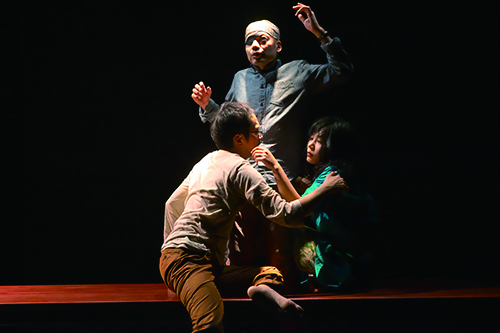
"Takeoff" Waseda Small Theater Dramakan (2015) Ⓒ Aoki Tsukasa
It's time to switch to Japanese sake...
What dance and theater can do in regional cities
Kim : The other day I went to Kochi Prefecture, Chikara's hometown, for "GERO."
Fujiwara : Ah, I wanted to hear that story!
Kim : So in Kochi, I learned how to pour sake. There's a proper way to do it. Do you understand it?
Fujiwara : Eh! I don't know. Can you help me out a bit?
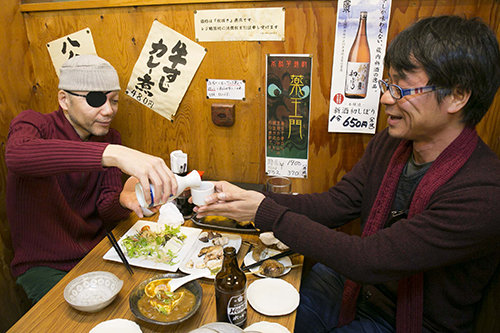
Pay attention to how Kim does it next!!!
Fujiwara : I see... Can I give you a hypothesis?
Does this mean you don't use the sharp spout of the tokkuri?
Kim : Right (laughs).
The reason is that it's a break in a circle (= edge).
Fujiwara : Wow!
Kim : What's more, apparently when the sake is poured, they drink it first without putting it on the table. So a lot of people who can't drink come, and the sake cups just keep piling up.
Fujiwara : Hahaha (laughs)
I'm originally from Kochi, but I came to Tokyo when I was 12, so I didn't really learn about Kochi's drinking culture. So it's a bit new to me (laughs).
Since it's Kochi, will the performance be at Karuport (Kochi City Cultural Plaza) ?
Kim : That's right.
There were seven performers, four local workshop participants and three from GERO, but the direction was quite different from the premiere of "Kuchikaraderu" at KAAT, and the work was created based on the stories told by the four local workshop participants. So, if the KAAT performance was 80% physical, the Carport performance was 80% words. We made oval seats and placed about 12 to 13 chairs inside them. Then the performers looked at the audience sitting there and gave a live report of the situation. The live report was something like "black hair," "brown (clothes)," "hands," "feet," "sitting on a chair," etc.
Kim : In the end, the direction was to move the audience in the inner seats to the oval seats on the outside, but what was funny was that one of our members, Yagi (Kotaro) , said to the audience, "Red cardigans, stand up!!" (laughs) But the audience didn't stand up, so in the end he had to apologise profusely, saying, "I'm sorry, I'm sorry, but please stand up..." He's an actor who rubs people the wrong way, which is rare for young people these days.
Fujiwara : He's an actor who gets on people's nerves (laughs). When I first saw him in "The Devil's Sign," I thought he was a strange guy, and I immediately remembered his name and face. It makes an impression. Even if I want to forget, I can't (laughs).
Kim : So, like the performance in Kochi, we call our activities of holding workshops and trial performances with people from all over Japan the "GERO Activity Project," and through these activities, we hope to be able to share time with the local people and exchange values. Furthermore, I hope that sharing in this way will be an inspiration for the public hall, the people of the town, and GERO. We won't know whether this will become a win-win-win relationship until we continue doing it.
Fujiwara : So your first stop was Kochi. I'm really happy about that.
In addition to what I was saying earlier about the boundary between theater and dance melting, I think that a big trend in the performing arts right now is the issue of "going to regional cities outside of Tokyo and doing what there." I come from the countryside and grew up in a culturally barren environment, so I'm happy to see culture spreading in this way. When I was in elementary school, I never had people like Yagi say anything to me (laughs).
Kim : I don't think so... (laughs)
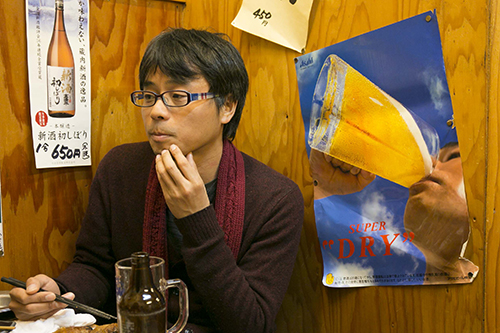
Fujiwara : I'm running low on alcohol, so I think I'll go to Hakkaisan.
Kim : I'll have the Kaga Tobi cold.
Fujiwara : That's great. Let's go for some hot sake again later when it gets cold.
Why do people want stories?
Kim : Do you always drink at places like this?
Fujiwara : Yes, I think I often drink at standing bars even in my private time. But when I want to think alone, I try not to go to my regular bar. Because I always end up talking to the regulars (laughs).
Kim : Don't you think about things at home?
Fujiwara : Almost none. I can say that with confidence (laughs).
Kim : Because you get caught up in life?
Fujiwara : No, it's too lonely... (laughs) I don't even drink at home. Home is just a place to get drunk and go home to sleep. I do read books while I sleep though. Kim, where do you go to think about your work when you're creating?
Kim : On the train. I take out my notebook and write down my thoughts. Also, when I'm watching someone else's performance, I often find myself thinking, "Oh, maybe this should be done this way," or "Oh, so that's how it's done. Maybe I'll try doing it like this next time." That's how I often get ideas by looking at someone else's work as a mirror and reflecting it back on myself.
Fujiwara : Does that usually happen when you see a good work? Or do you think it happens more often when you're like, "Oh no!"
Kim : I don't know (laughs). I think it's probably better to be somewhere in the middle. If it's a really good work, you get engrossed in it, so being indecisive might give you more room to think. The other day, I went to see the Okazaki Art Theatre, and I thought a lot about it then too. Ah, no, it's not like it was somewhere in the middle or anything... (sweats)
Everyone : lol
Kim : No, I was originally interested in words, but I always thought it wasn't because I wanted to do theater. The reason I don't enjoy theater that much when I go see it is because I find it annoying to have to follow the story. So I thought I'd do it in a different way if I were to do it myself, and in "GERO" I took a live commentary style. So, even though the setting at Okazaki Art Theatre was interesting, it was quite difficult to follow the story being told...
How do people watch plays?
Fujiwara : I guess I don't really follow the storyline. So when I write a review, for better or worse, I don't place much importance on the plot. I wasn't originally into theater, and I preferred reading novels and watching movies, so I guess I don't look for a story in theater. Rather, I'm more interested in what's happening in front of me and how far it captures a world that's far away.
Kim : But why do people seek stories, be they novels, movies, or plays?
Fujiwara : So you yourself don't really want one, Kim?
Kim : I don't want a story. I like short stories though.
Fujiwara : Short stories, huh? For example, I don't think people actually enjoy rakugo stories. I think people are drawn to the art of storytelling, the entertaining performance of the storyteller, and the connection of the words as sounds. I think myths are interesting, for example. They tend to develop quite outrageously, and are quite different from modern sensibilities.
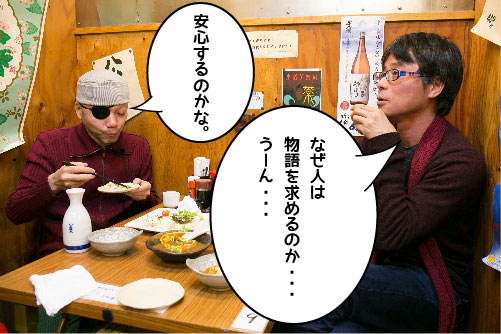
Fujiwara : I think stories and dramas started to become formulaic and patterned, especially around the time of the trendy dramas of the 90s.
In ancient Greece, professional writers appeared and dramatized myths, giving birth to theater, and various stories were created, but I think the first stories were born from the desire to convey something to others. Before we knew it, stories themselves became consumer goods, and became something that we passively watched and enjoyed. In Japan, I think that this way of consumption was once perfected with trendy dramas.
Kim : Amazing (laughs) From Greek mythology to trendy dramas...
Fujiwara : It's quite a leap though (laughs). And I'm looking forward to seeing what future storytellers will do.
Kim : I also think that a story starts with something that happens locally and in your neighborhood.
We've just talked about conveying something to others, but in my case, when I do that, I think about what is between me and the other person. First, there's the act of exhaling using the lungs, and then there's the act of vibrating the vocal cords and making the sound "ah" on top of the breath. I think it's only when you add sounds like "you you you" that it becomes meaningful, but before you get to that "you" point, I wonder if we can explore the state before it has meaning. I think that could be anything, like a simple moan or groan, talking in your sleep, snoring, or sighing.
Fujiwara : Talking in my sleep, snoring, sighing... (laughs)
Kim : Yes. And if I go in a slightly different direction, maybe it could turn into song or reciting poetry... That's what I'm interested in.
Oh, by the way, is it time to move on to the main topic of "Eros and Chaos"? (laughs)
Dance and Eros
Fujiwara : I completely forgot about the theme... (laughs)
The reason why I chose eroticism is, firstly, that Kim-san was quite erotic in the sample piece "Takeoff," and secondly, that when I go to see a dance performance, I always feel that eroticism is right next to me. Of course, "GERO" is not aiming for eroticism itself, but as you just said, I think that eroticism is born when you try to move away from the meaning of words. In other words, when you turn your back on the story, eros appears.
Kim : Yes. I think that eros is where you end up no matter what. I think dance is sex. When I practice, it's like I'm entering the labyrinth of my own body and exploring inside it. If I go here, it's like this, if I go there, it's like this... I go on an adventure inside my body. And I report the results of that journey to the audience. Especially when I've just started dancing. So, I think that sex is similar to the process of creating dance, except that my body becomes the other person's body. So in that sense, I'm glad I did dance.
Fujiwara : Why is that?
Kim : Most people don't explore their own bodies, but especially in Butoh, you travel the world with your dance practice.
Fujiwara : What? Travel the world? What do you mean?
Kim : My teacher, Anzu Furukawa, taught me a weight transfer exercise, which involves spreading your arms and quickly putting one foot forward, then slowly moving the foot that's left behind forward and pushing it forward, and repeating that. When you put one foot forward, there's a gap of several tens of centimeters between your feet. Then the ground cracks, and the crack circles the Earth, and just before the Earth splits in two, you're told to put your other foot forward. I had never thought of that before, so I was like, "What is that?" It's just something we do in the rehearsal room, but it spreads from the rehearsal room to the Earth.
Fujiwara : That's amazing (laughs)
Kim : They often say that the human body is a microcosm, and because I've come to view my body from that perspective, I've always had the sensation of exploring the universe with my body. If you apply that sensation to a sexual partner, it becomes more than just the union of flesh and blood; to put it in extreme terms, it becomes like exploring the other person's universe.
Fujiwara : Coincidentally, the word "space" just came up. When I was deciding on the theme, I was really hesitant about making it "Eros and Space."
Kim : That's good too. (Laughs)
Staff : This is fish soup.
Fujiwara : Oh! Looks delicious.

Words with less meaning
Fujiwara : Why did you become interested in words, Kim?
Kim : I was not good at writing book reports in elementary and junior high school, and I didn't read many books. So I started dancing with Furukawa Anzu before I became familiar with words. She would throw all kinds of word images at me in practice, and when I became independent and started teaching, I realized that I needed words to convey my dance, which doesn't have a form like ballet or Japanese dance, to people. I was intrigued by the feeling that the magic of words could bring the mess inside me together, and that's how I became interested in words. From there, I started the "Body Japanese Dictionary" with the idea of connecting the body and words. It's a dictionary of idiomatic expressions related to the body, such as "wash your feet" and "cut your hands," and I'm currently collecting them to interpret each word and make it into a dictionary.
On a side note, for some reason, many idioms related to the body have negative connotations. "Quick to use," "Unruly," "Can't keep one's head up"...
Fujiwara : Interesting! But it's kind of sad...
Kim : Right. I thought the relationship between the body and words was inseparable, and that's why I started "GERO."
Fujiwara : You've been doing dance all your life, so when you launched "GERO" you were conscious of using words, which must have been a new endeavor.
Kim : It's a lot of trial and error. I can't see the end goal and I'm running around confused.
Fujiwara : At the beginning of today's performance, you said that you found the expert's opinions of the "GERO" performance harsh, but that may be due to the difficulty of structural analysis. I think that what Kim is trying to do now is difficult to grasp as a structure. It is easier for the audience to jump on the work and write a critique if you can see the structure of the work, such as the story, development, and spatial arrangement. However, that is next to the world of meaning. I think that searching for something less than meaning means plunging one's foot into a world that is extremely difficult to understand.
Kim : I don't really know myself. And I don't think that what I announced this time was necessarily what I wanted to do. Words aren't my forte, so I think I'll continue to waver from now on. This time I'll waver right, then I'll waver left, then I'll waver forwards and backwards, and I think I'll be wavering for a while, and that's how I want to be.
Fujiwara : That means you're willing to take your time.
Kim : That's right.
By the way, it's not erotic or chaotic at all. Is that okay?
Fujiwara : ...(laughs)
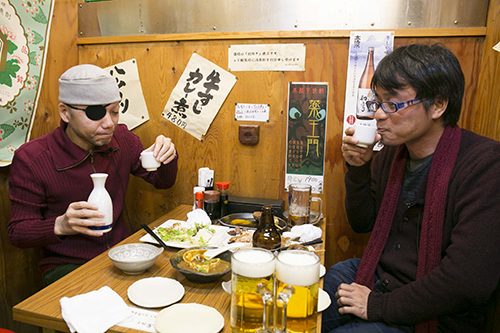
As the number of customers gradually increased, the group that had been drinking since noon decided to leave.
Eros and Chaos (Extra Edition)
After the recording, we took the opportunity to stroll around Mizonokuchi West Exit Shopping Street.
Then I discovered this used bookstore nearby! I decided to pop in without an appointment.
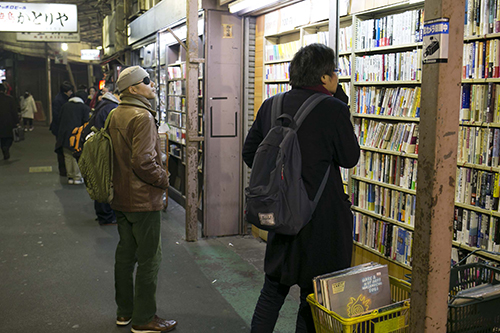
The store is packed with a wide variety of books. Is this chaos?
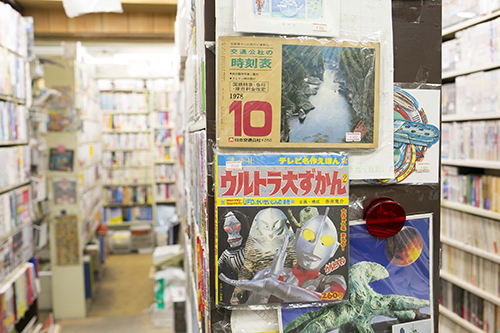
And we discovered an even more chaotic phenomenon near the cash register!
To my surprise, the owner of the bar, Mr. Kikuchi, was drinking alcohol even though he was at work!!!
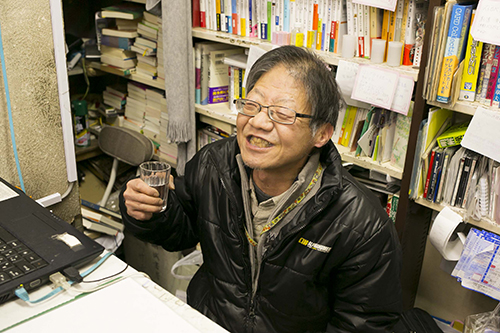
That's a nice smile (laughs)
In addition, an "erotic" corner was set up in one corner of the store, where the three men, including the photographer, enjoyed themselves for a while.
And a few minutes later...
They seemed to have found a bargain, as the two of them hurriedly headed to the cash register.
So, what did I buy?
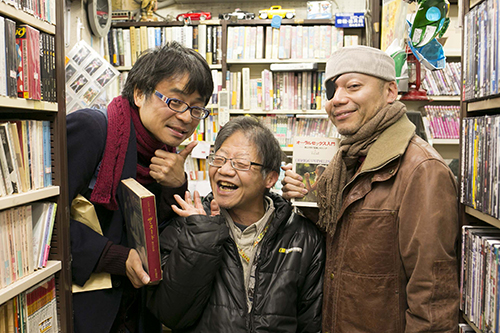
"The Nude" and "Introduction to Oral Sex" ...?
So, after drinking at Tamai West Exit, please be sure to stop by Meiseishobo. However, if you enter in a group of 3 or more, you may be mistaken for a shoplifting team, so be careful. Apparently, at first, we were also on guard, thinking, "We're bandits!" If you go to Meiseishobo, I recommend that you go unarmed so the owner doesn't get suspicious (lol).
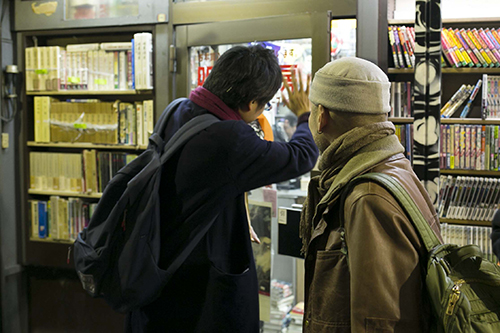
In the end, we became good friends and promised to come again before leaving.
So that was the final episode with an unexpected punchline. You can see the archive of Kanagawa Standing Drinking Culture Talk from the link below.
Before that, don't forget to check out the information about Taishu Sakaba Tamai Nishiguchi Branch, who helped us out today!
Here's some information about the store.
Here is the food we had today
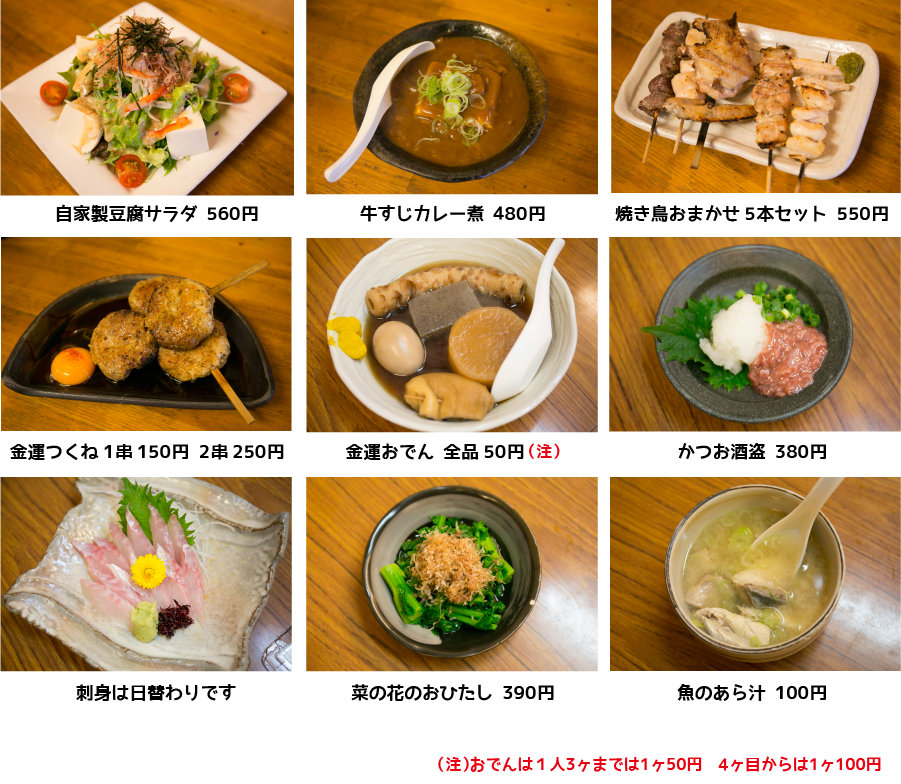
And what's today's recommendation?

Popular Bar Tamai West Exit
http://tabelog.com/kanagawa/A1405/A140505/14039459/
2-7-11 Mizonokuchi, Takatsu-ku, Kawasaki City, Kanagawa Prefecture
TEL: 050-5869-7930 (reservations only) / 044-833-5775 (inquiries only)
Closed: Open all year round
Business hours: 15:00-24:00 (last order 23:30)
Access: 1 minute walk from the main ticket gate of Mizonokuchi Station
